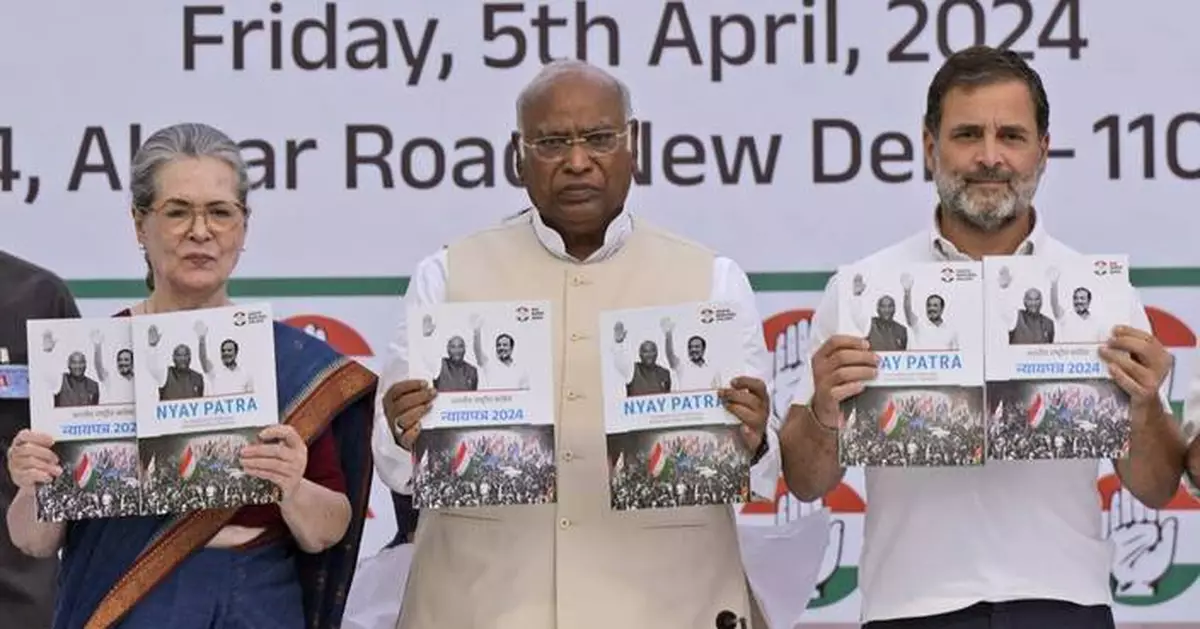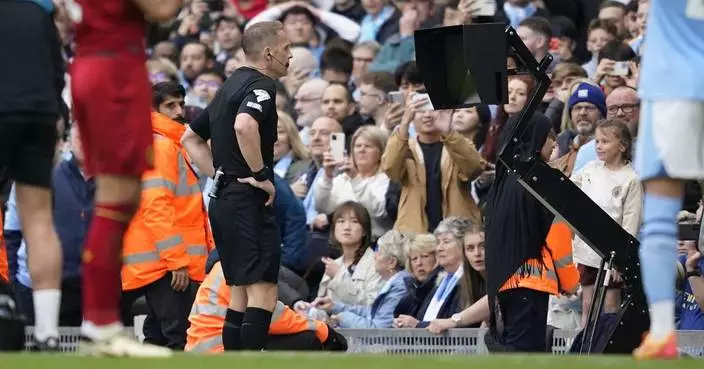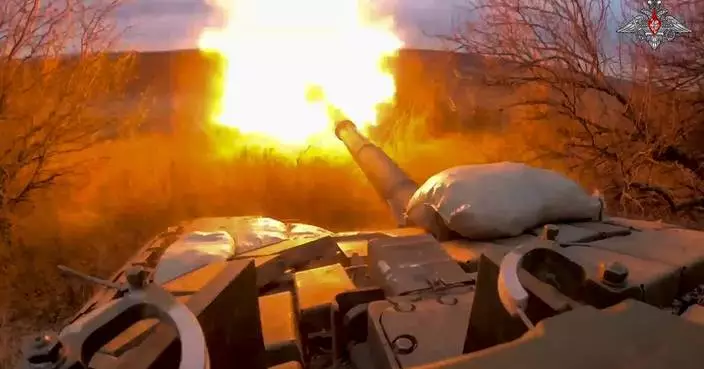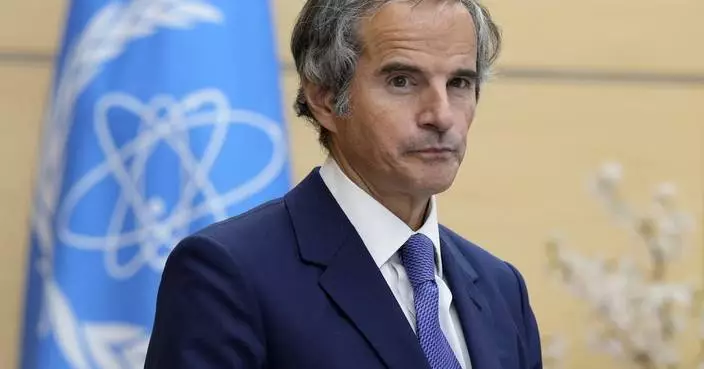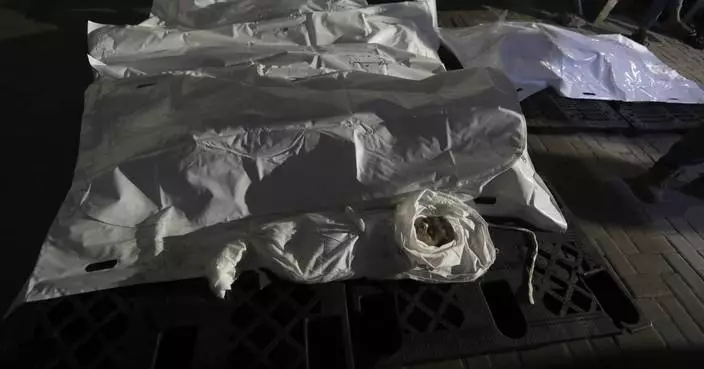NEW DELHI (AP) — India’s main opposition party vowed to boost social spending and reverse what it views as a slide into autocracy as it laid out its campaign promises on Friday, two weeks before the start of a weeks-long, multi-phase general election.
Most polls have predicted a victory for Prime Minister Narendra Modi and his Hindu nationalist Bharatiya Janata Party for a third straight five-year term. But the Congress Party argues that he's undermined India's democracy and favored the interests of the rich in its election manifesto.
Click to Gallery
NEW DELHI (AP) — India’s main opposition party vowed to boost social spending and reverse what it views as a slide into autocracy as it laid out its campaign promises on Friday, two weeks before the start of a weeks-long, multi-phase general election.
India’s opposition Congress party leaders from left, Sonia Gandhi, Mallikarjun Kharge, Rahul Gandhi and K.C.Venugopal look at copies of party’s election manifesto during a press conference in New Delhi, India, Friday, April 5, 2024. India's 6-week-long general election starts on April 19 and results will be announced on June 4. (AP Photo/Manish Swarup)
India’s opposition Congress party president Mallikarjun Kharge, gestures during a press conference to release the party’s election manifesto in New Delhi, India, Friday, April 5, 2024. India's 6-week-long general election starts on April 19 and results will be announced on June 4. (AP Photo/Manish Swarup)
A worker sweeps the premises of India’s main opposition Congress party headquarters during party's manifesto release in New Delhi, India, Friday, April 5, 2024. Congress party released its election manifesto on Friday urging people to vote out Prime Minister Narendra Modi whom it described as autocratic and promising economic reforms to lift 230 million people out of poverty in 10 years. (AP Photo/Manish Swarup)
India’s opposition Congress party leaders from left, Sonia Gandhi, Mallikarjun Kharge, and Rahul Gandhi, display copies of party’s election manifesto during a press conference in New Delhi, India, Friday, April 5, 2024. India's 6-week-long general election starts on April 19 and results will be announced on June 4. (AP Photo/Manish Swarup)
India holds elections on different days in different parts of the country, stretching over weeks. Voting for the country's parliament this year will begin on April 19 and run until June 1, and the results will be announced on June 4.
Modi is broadly popular in India, where he’s considered a champion of the country’s Hindu majority and has overseen rapid economic growth. But critics say another term for the BJP could undermine India's status as a secular, democratic nation, saying it's 10 years in power have brought attacks by Hindu nationalists against the country’s minorities, particularly Muslims, and a shrinking space for dissent and free media.
Rahul Gandhi, a former Congress party president, said “this election is fundamentally a different election. I don’t think that democracy has been as much at risk, the constitution has been at as much risk as it is today.”
Congress's president, Mallikarjun Kharge, accused the government of crippling his party by freezing its bank accounts in a tax dispute ahead of national elections. Tax authorities have demanded nearly 35 billion rupees ($426 million) from the Congress party.
The BJP said the Congress party’s bank accounts were partially frozen because it had failed to file an income tax return for cash donations it received from 2017-18 onward, and it had therefore lost the tax exemption available to political parties.
The Modi government has opened tax investigations against a number of critical voices in recent years and cited tax issues to cancel the registration of many foreign-funded non-governmental organizations.
In February last year, tax authorities carried out searches of the BBC’s New Delhi and Mumbai offices saying that it had not fully declared its income and profits from its operations in the country. The searches came after the British broadcaster aired a documentary in the U.K. that criticized Modi.
Congress also attacked Modi's economic record, saying that despite strong growth he’s presided over a widening gap between rich and poor and that his economy has failed to provide jobs for many Indians.
The official unemployment rate was 4% in 2023, but Congress wrote that the government has under-counted unemployment, citing its own surveys.
According to the Center for Monitoring Indian Economy, CMIE, a leading private business information company, the unemployment rate in India stood at 8.3% in December, up from 6.5% in January 2022.
Congress laid out economic plans it said could lift 230 million people out of poverty in 10 years, targeting poverty, unemployment and low agricultural prices.
It's promising to give each woman in a poor family 100,000 rupees ($1,200) a year, to spend a similar amount on apprenticeships for people below 25, to fill nearly 3 million vacancies in the federal government, and to boost a cap on public health insurance payments from 500,000 rupees per incident to 2.5 million.
The BJP has implemented social programs that improved access to clean toilets, health care, and cooking gas, and introduced programs that provide free grain to the poor and pay 6,000 rupees ($73) a year to poor farmers.
Congress also promised to raise incomes for farmers with policies including wider use of minimum crop price policies. Tens of thousands of Indian farmers protested in India in 2021 to demand guaranteed crop prices, and in March this year thousands went to New Delhi with renewed demands.
The BJP is expected to release its election manifesto next week.
Prime Minister Modi has been campaigning extensively across the country, promising to expand the country's economy to $5 trillion by 2027 from around $3.7 trillion. He is also promising to put India on track to become a developed country by 2047, when the country celebrates 100 years of independence from British colonialists.
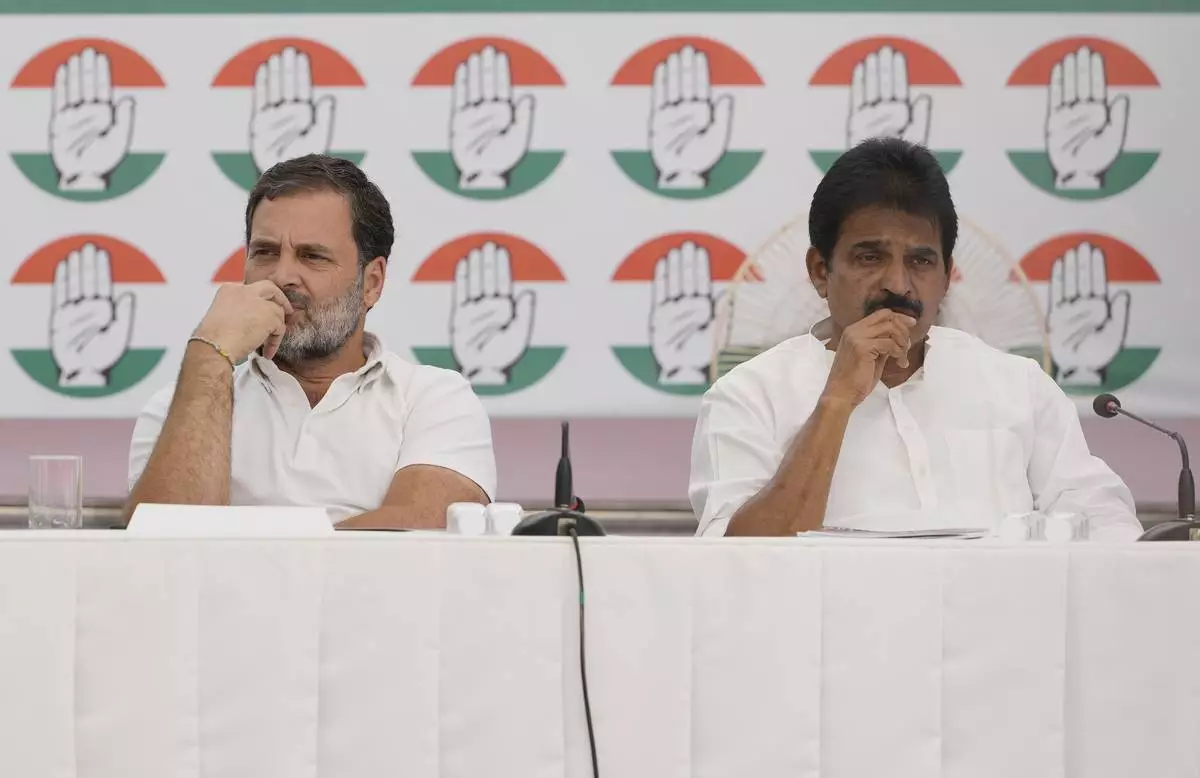
India’s opposition Congress party leaders from left, Rahul Gandhi and K.C.Venugopal look on during a press conference to release the party’s election manifesto in New Delhi, India, Friday, April 5, 2024. India's 6-week-long general election starts on April 19 and results will be announced on June 4. (AP Photo/Manish Swarup)
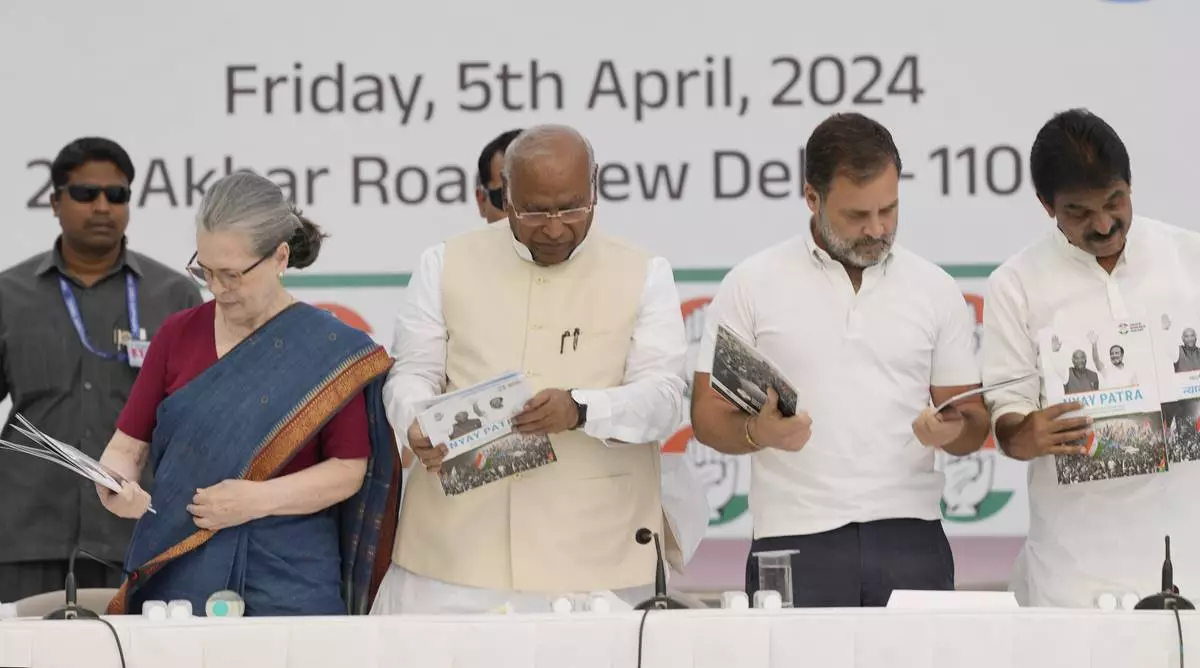
India’s opposition Congress party leaders from left, Sonia Gandhi, Mallikarjun Kharge, Rahul Gandhi and K.C.Venugopal look at copies of party’s election manifesto during a press conference in New Delhi, India, Friday, April 5, 2024. India's 6-week-long general election starts on April 19 and results will be announced on June 4. (AP Photo/Manish Swarup)
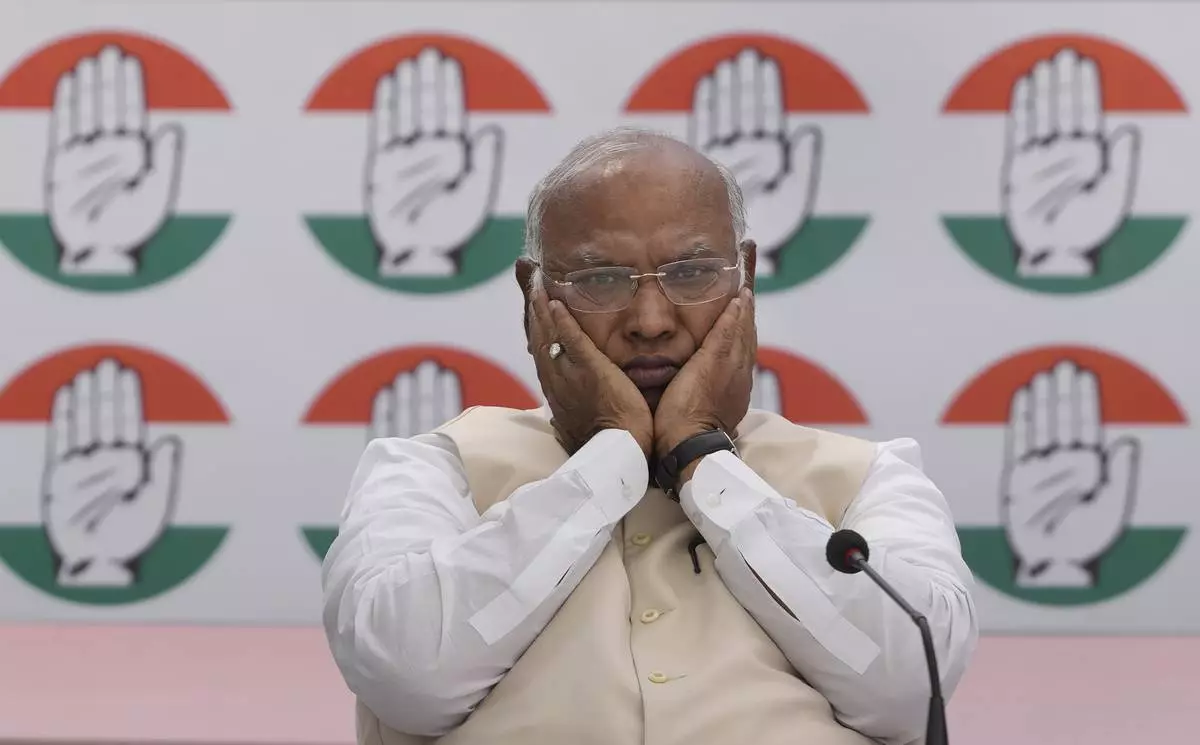
India’s opposition Congress party president Mallikarjun Kharge, gestures during a press conference to release the party’s election manifesto in New Delhi, India, Friday, April 5, 2024. India's 6-week-long general election starts on April 19 and results will be announced on June 4. (AP Photo/Manish Swarup)
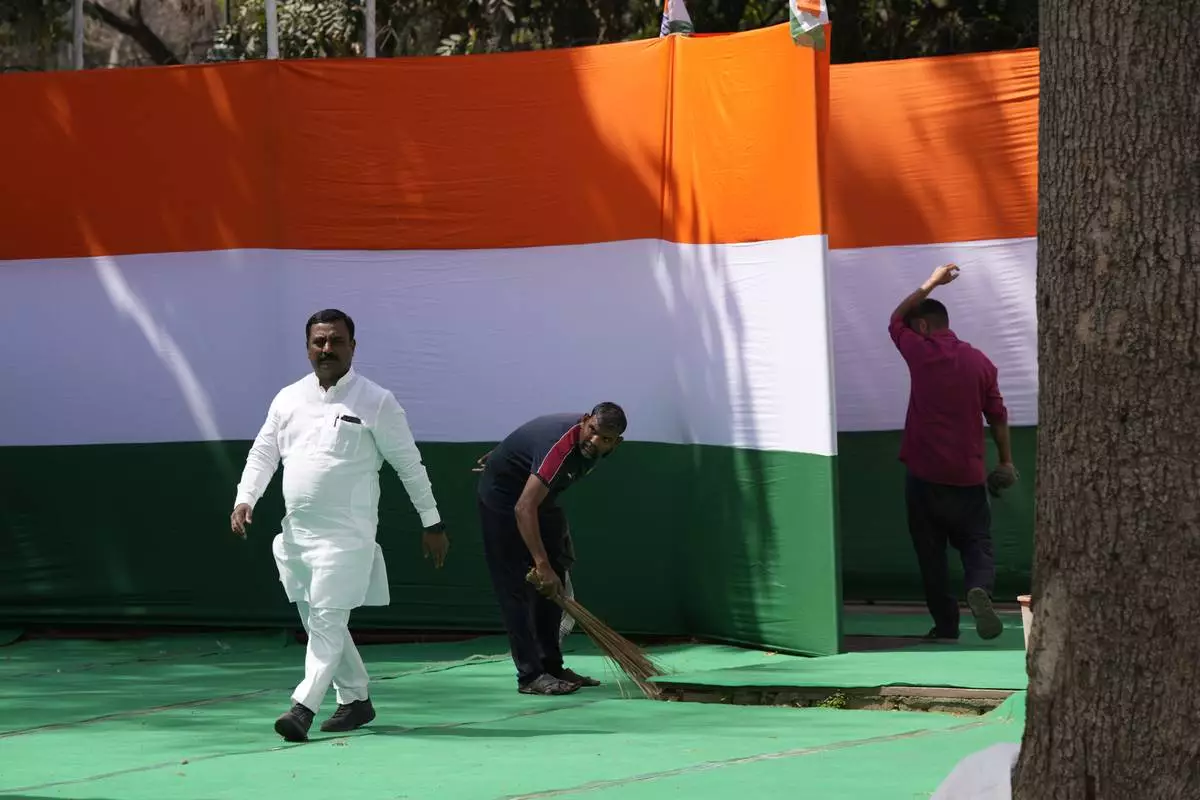
A worker sweeps the premises of India’s main opposition Congress party headquarters during party's manifesto release in New Delhi, India, Friday, April 5, 2024. Congress party released its election manifesto on Friday urging people to vote out Prime Minister Narendra Modi whom it described as autocratic and promising economic reforms to lift 230 million people out of poverty in 10 years. (AP Photo/Manish Swarup)
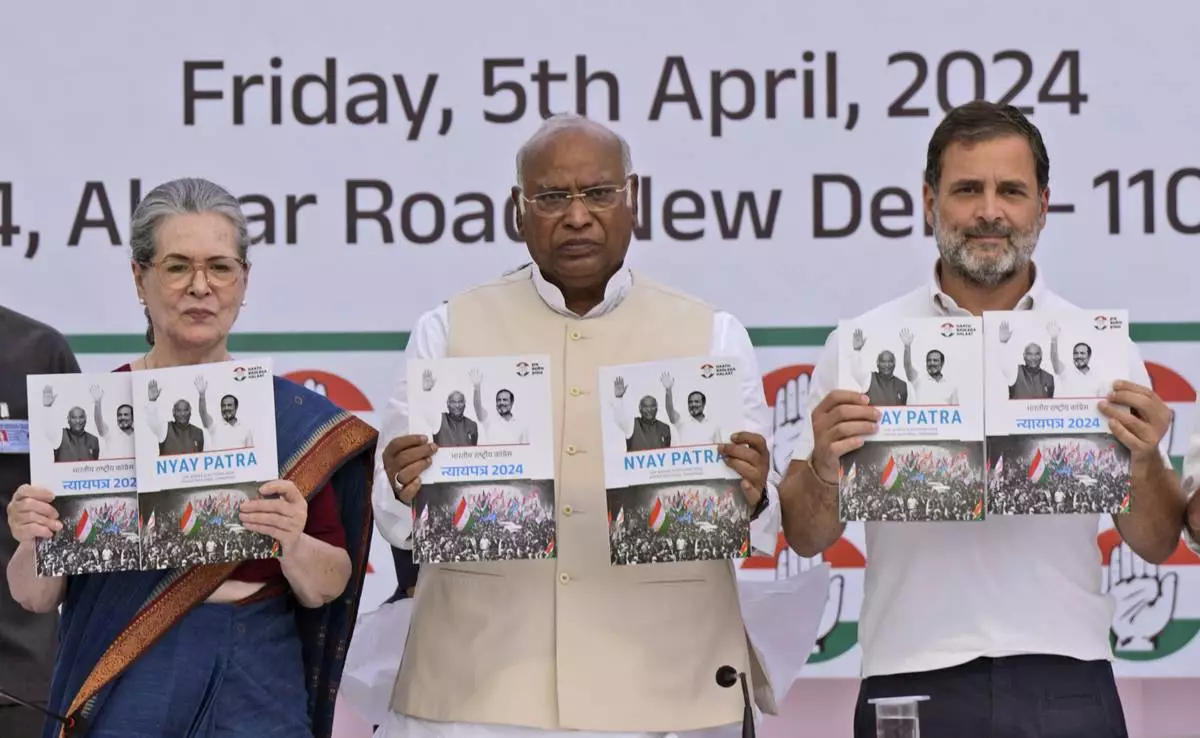
India’s opposition Congress party leaders from left, Sonia Gandhi, Mallikarjun Kharge, and Rahul Gandhi, display copies of party’s election manifesto during a press conference in New Delhi, India, Friday, April 5, 2024. India's 6-week-long general election starts on April 19 and results will be announced on June 4. (AP Photo/Manish Swarup)
JERUSALEM (AP) — The Israeli army on Monday ordered tens of thousands of Palestinians in the southern city of Rafah in the Gaza Strip to start evacuating from the area, signaling that a long-promised ground invasion there could be imminent.
The announcement complicates last-ditch efforts by international mediators, including the director of the CIA, to broker a cease-fire. The militant Hamas group and Qatar, a key mediator, have warned that invading Rafah — along the border with Egypt — could derail the talks, and the United States has repeatedly urged Israel against the invasion.
However, Israel has described Rafah as the last significant Hamas stronghold after seven months of war, and its leaders have repeatedly said the invasion is necessary to defeat the Islamic militant group.
Lt. Col. Nadav Shoshani, an army spokesman, said some 100,000 people were being ordered to move to a nearby Israel-declared humanitarian zone called Muwasi. He said Israel was preparing a “limited scope operation” and would not say whether this was the beginning of a broader invasion of the city. But after Oct. 7 and the unprecedented attack on southern Israel by Hamas, Israel did not formally announce the launch of a ground invasion that continues to this day.
Overnight, Defense Minister, Yoav Gallant, told U.S. Secretary of Defense, Lloyd Austin that Israel had no choice but to act in Rafah. On Sunday, Hamas carried out a deadly rocket attack from the Rafah area that killed four Israeli soldiers.
Shoshani said Israel published a map of the evacuation area, and that orders were being issued through air-dropped leaflets, text messages and radio broadcasts. He said Israel has expanded humanitarian aid into Muwasi, including field hospitals, tents, food and water.
Israel's army said on the social platform X that it would act with “extreme force” against militants, and urged the population to evacuate immediately for their safety.
Israel's plan to invade Rafah has raised global alarm because of the potential for harm to more than a million Palestinian civilians sheltering there.
About 1.4 million Palestinians — more than half of Gaza’s population — are jammed into the city and its surroundings. Most of them fled their homes elsewhere in the territory to escape Israel’s onslaught and now face another wrenching move or the danger of staying under a new assault. They live in densely packed tent camps, overflowing U.N. shelters or crowded apartments, and are dependent on international aid for food, with sanitation systems and medical facilities infrastructure crippled.
The U.N. agency that has helped millions of Palestinians in Gaza and the West Bank for decades, known as UNRWA, warned Monday of devastating consequences of a Rafah offensive, including more civilian suffering and deaths. The agency said it would not leave but stay in Rafah as long as possible to continue providing lifesaving assistance.
Egypt’s Rafah crossing, a main transfer point for aid going into Gaza, lies in the evacuation zone. The crossing remained open on Monday after the Israeli order.
But even as the U.S., Egypt and Qatar have pushed for a cease-fire agreement, Israeli Prime Minister Benjamin Netanyahu repeated last week that the military would move on the city “with or without a deal” to achieve its goal of destroying the Hamas militant group.
On Monday, Netanyahu accused Hamas of “torpedoing” the hostage deal and not budging from its “extreme demands” while vowing to stop the militants from retaking control of Gaza. In a fiery speech Sunday evening marking the country’s annual Holocaust memorial day, he rejected international pressure to halt the war, saying that "if Israel is forced to stand alone, Israel will stand alone.”
A Hamas official told The Associated Press that Israel is trying to pressure the group into making concessions on the cease-fire, but that it won't change its demands. Hamas wants a full end to the war, withdrawal of Israeli troops from Gaza and the eventual reconstruction of the strip in exchange for the Israeli hostages held by the militants.
Shoshani would not say whether the upcoming Rafah operation is a response to Sunday's attack by Hamas that forced Israel's key border crossing for aid to close. He said it would not affect how much aid enters Gaza as other crossing points remain operational.
He wouldn't comment, however, on U.S. warnings not to invade and wasn't clear on whether Monday's evacuation order was coordinated with Egypt.
Egypt, a strategic partner of Israel, has said that an Israeli military seizure of the Gaza-Egypt border — which is supposed to be demilitarized — or any move to push Palestinians into Egypt would threaten its four-decade-old peace treaty with Israel.
In Rafah, people received flyers Monday morning in Arabic detailing which neighborhood blocks needed to leave and where humanitarian zones had expanded to. The flyers said that aid services would spread from Deir al Balah in the north to the center of Khan Younis city in the middle of the Gaza Strip.
“Anyone found near (militant) organizations endangers themselves and their family members. For your safety, the (army) urges you to evacuate immediately to the expanded humanitarian area”, it read.
Palestinians in Rafah said people gathered to discuss their options after receiving the flyers. Most said they did not want to move alone and preferred to travel in groups.
“So many people here are displaced and now they have to move again, but no one will stay here it’s not safe,” Nidal Alzaanin told The Associated Press by phone.
A father of five, Alzaanin works for an international aid group and was displaced to Rafah from Beit Hanoun in the north at the start of the war. He said people are concerned since Israeli troops shot at Palestinians as they moved during previous evacuation orders.
Alzaanin said he has packed his documents and bags but will wait 24 hours to see what others do before relocating. He said he has a friend in Khan Younis whom he hopes can pitch a tent for his family.
But some people say they're too tired and fed up of months of devastation to flee again.
Sahar Abu Nahel was displaced to Rafah with 20 of her family, her husband is being held by Israel, her son-in-law in missing, she said.
“Where am I going to go? I have no money or anything. I am seriously tired as are (my) children," she said wiping tears from her cheeks. “Maybe its more honorable for us to die. We are being humiliated,” she said.
Mroue reported from Beirut.
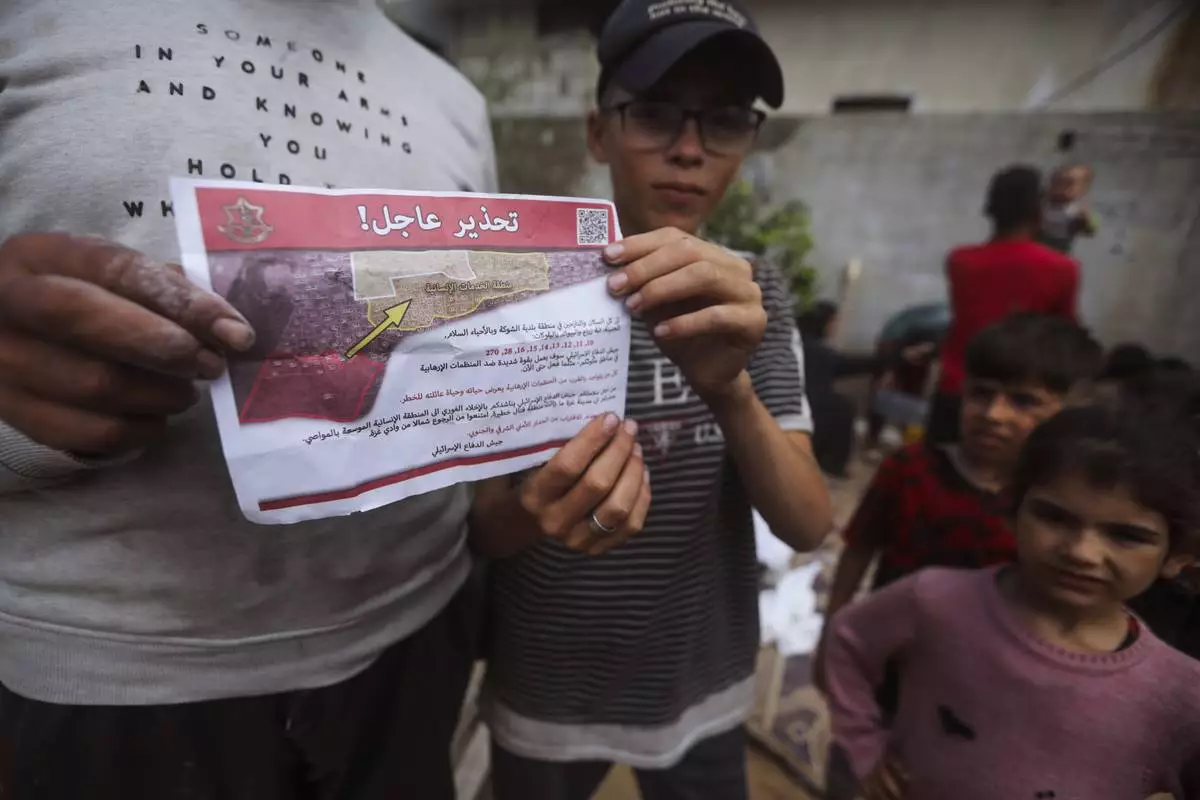
Palestinians hold leaflets dropped by Israeli planes calling on them to evacuate ahead of an Israeli military operation in Rafah, southern Gaza Strip, Monday, May 6, 2024. The order affects tens of thousands of people and could signal a broader invasion of Rafah, which Israel has identified as Hamas' last major stronghold after seven months of war. (AP Photo/Ismael Abu Dayyah)
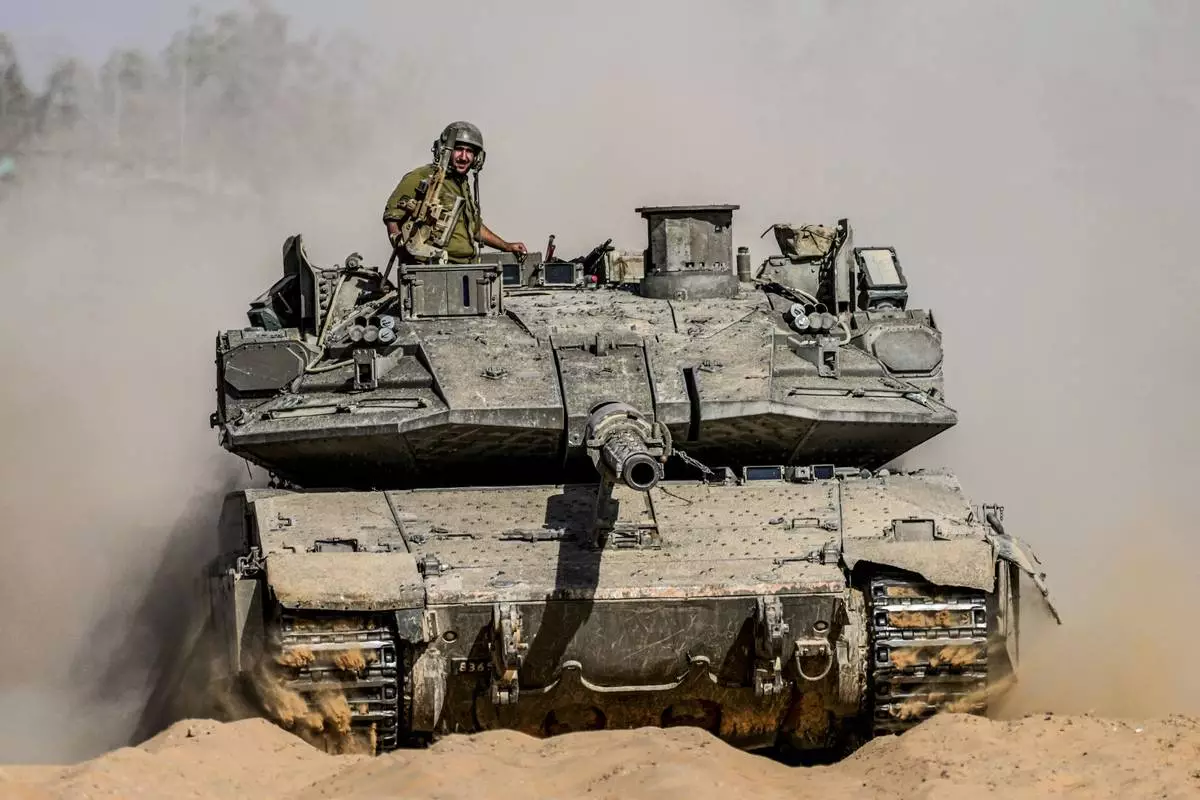
Israeli soldiers drive a tank at a staging ground near the border with the Gaza Strip, in southern Israel, Sunday, May 5, 2024. (AP Photo/Tsafrir Abayov)
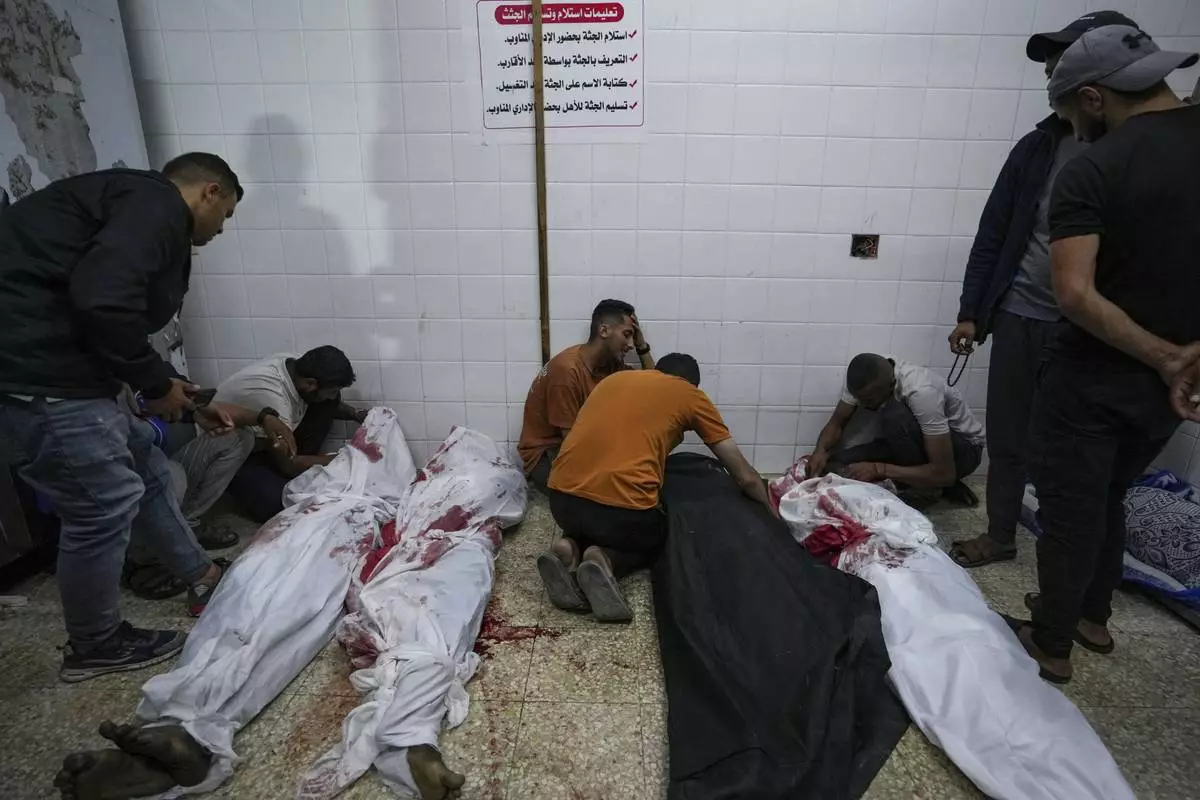
Palestinians react next to the bodies of their relatives who were killed in an Israeli airstrike in Gaza Stirp, at the Al Aqsa hospital in Deir al Balah, Gaza, Sunday, May 5, 2024. (AP Photo/Abdel Kareem Hana)
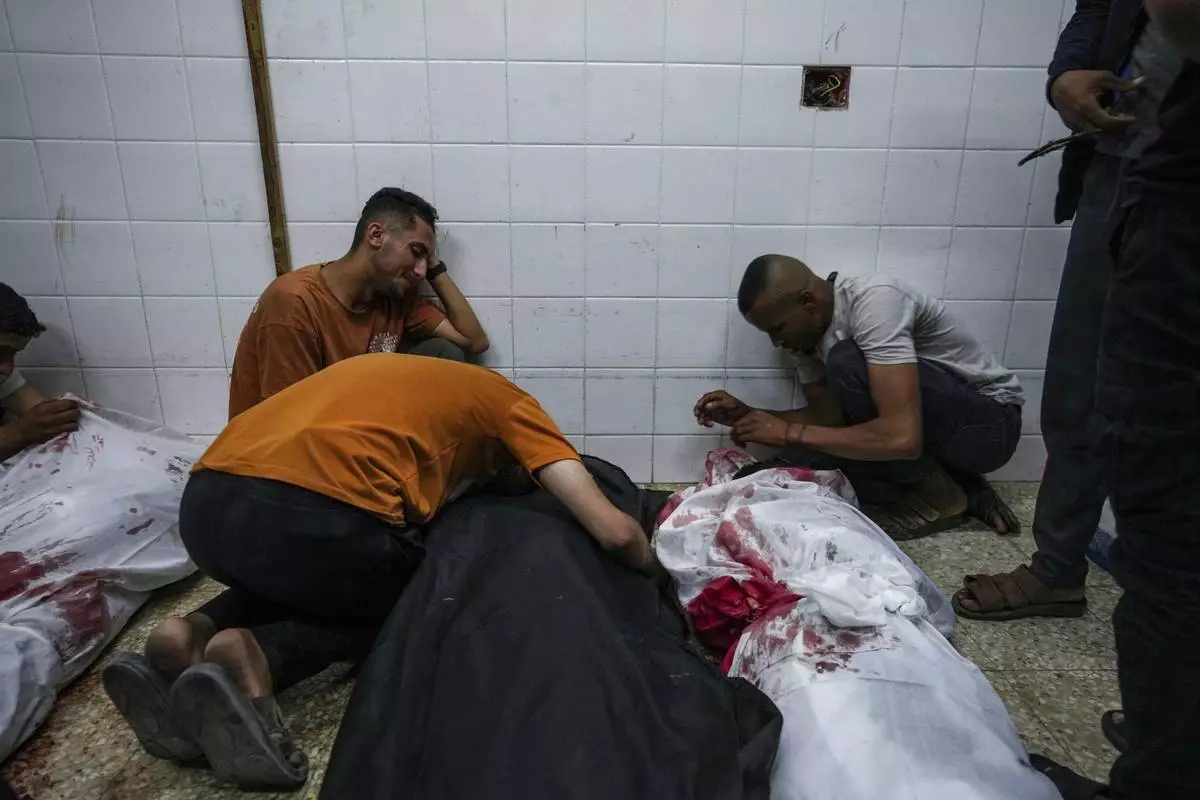
Palestinians react next to the bodies of their relatives who were killed in an Israeli airstrike in Gaza Stirp, at the Al Aqsa hospital in Deir al Balah, Gaza, Sunday, May 5, 2024. (AP Photo/Abdel Kareem Hana)
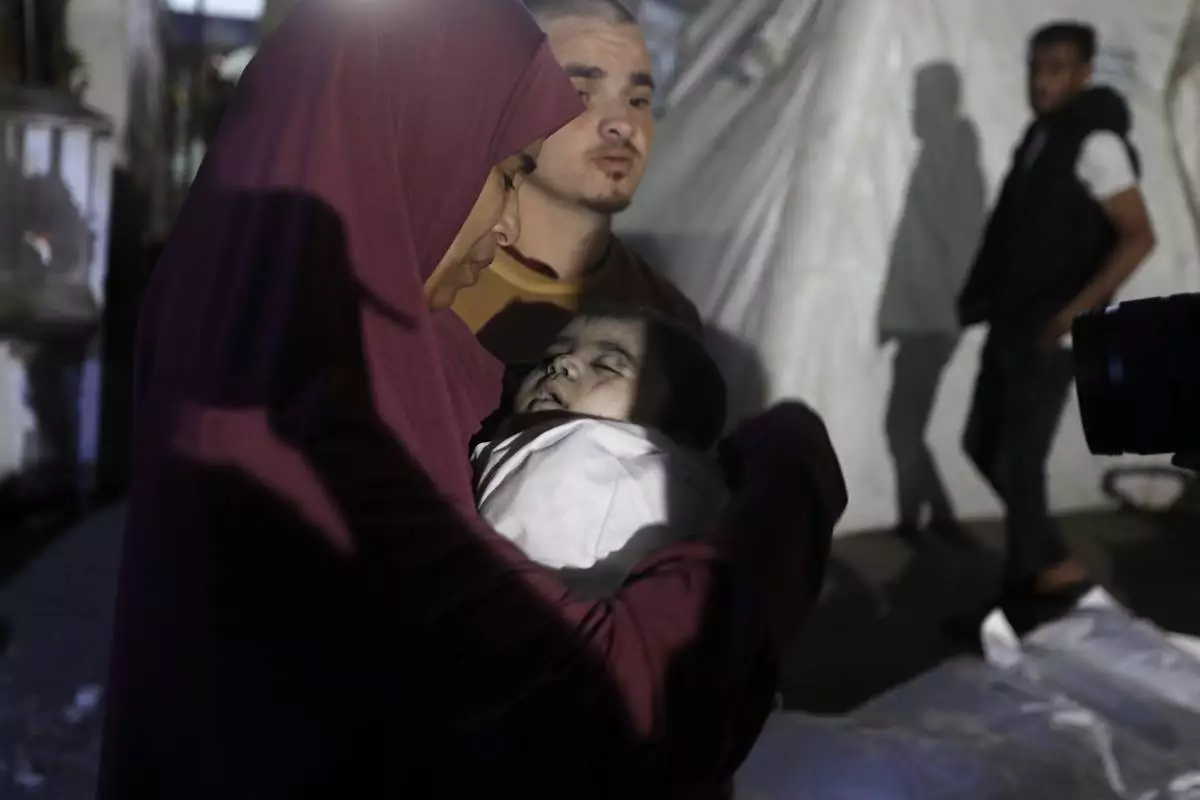
A Palestinian woman mourns her relative, 7-month old baby Hani Qeshta, who was killed in an Israeli bombardment on a residential building with Qeshta's family, at the morgue of Al Najjar hospital in Rafah, southern Gaza Strip, Sunday, May 5, 2024. (AP Photo/Ismael Abu Dayyah)
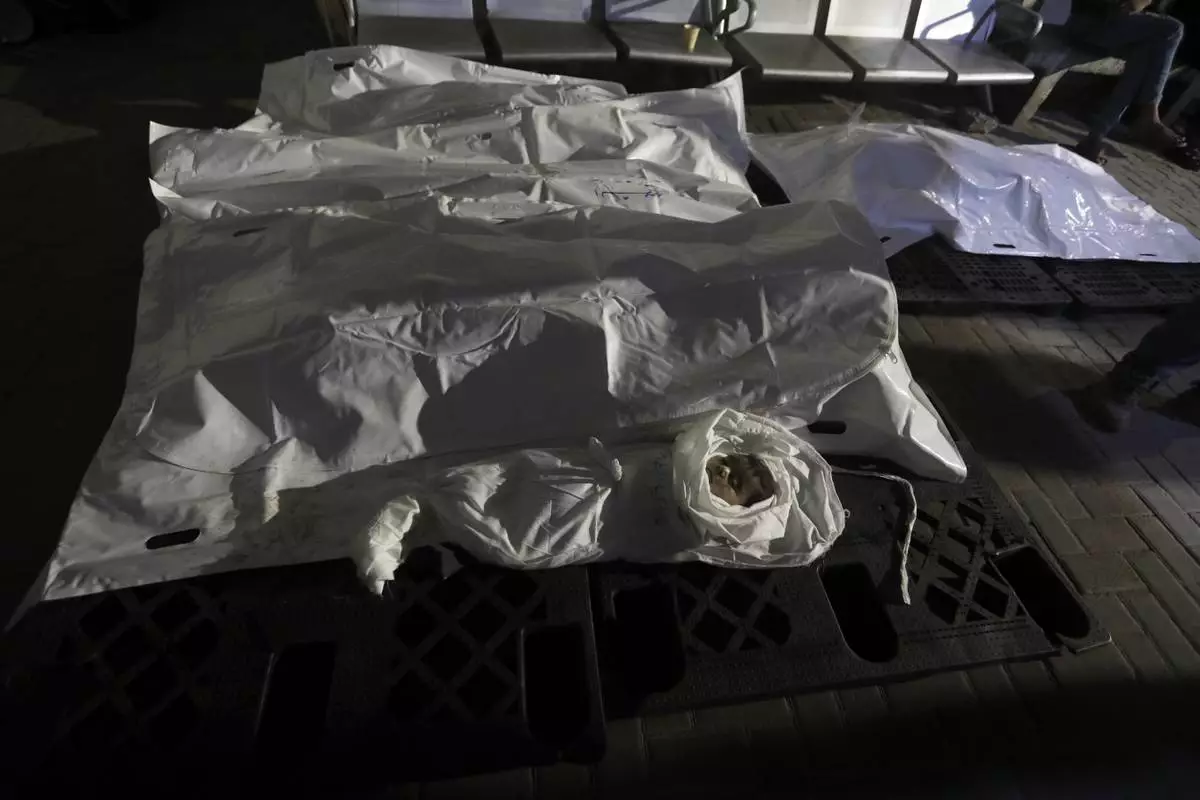
The Qeshta family is seen in body bags at the morgue of Al Najjar hospital in Rafah, southern Gaza Strip, Sunday, May 5, 2024. The family was killed in an Israeli bombardment on a residential building in Rafah. (AP Photo/Ismael Abu Dayyah)
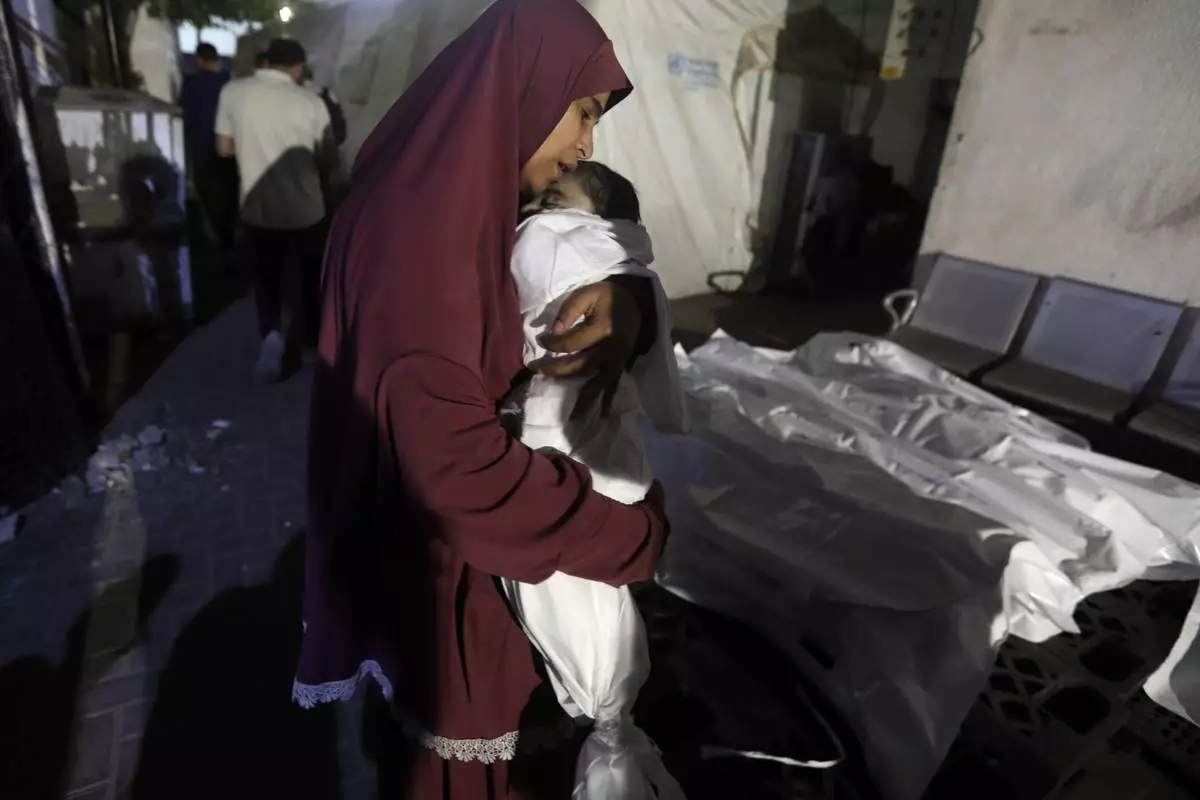
A Palestinian woman mourns her relative, 7-month old baby Hani Qeshta, who was killed in an Israeli bombardment on a residential building with Qeshta's family, at the morgue of Al Najjar hospital in Rafah, southern Gaza Strip, Sunday, May 5, 2024. (AP Photo/Ismael Abu Dayyah)







